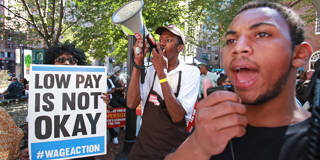The skewing of income toward the top 1% of earners has become a central issue in American politics, with both Republicans and Democrats proposing higher taxes on the rich. But new research finds that it may not be true, suggesting that policymakers would do better to focus more on helping the working class.
WASHINGTON, DC – For decades, the share of national income held by the top 1% in the United States has soared. Income inequality, which former President Barack Obama declared “the defining challenge of our time,” has become a major issue in American politics, with both Republicans and Democrats proposing higher taxes on the rich. The idea, peddled by nationalists and progressives, that the economic system is rigged against ordinary workers and households has also fanned the flames of populism. Some even argue that economic inequality threatens democracy.

WASHINGTON, DC – For decades, the share of national income held by the top 1% in the United States has soared. Income inequality, which former President Barack Obama declared “the defining challenge of our time,” has become a major issue in American politics, with both Republicans and Democrats proposing higher taxes on the rich. The idea, peddled by nationalists and progressives, that the economic system is rigged against ordinary workers and households has also fanned the flames of populism. Some even argue that economic inequality threatens democracy.